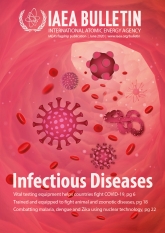The global response to COVID-19 has reinforced humanity’s resilience and spotlighted the unparalleled power of creative partnerships. It also highlights the stark human and financial cost of weak health systems, the consequences of which are unfortunately keenly familiar to those communities dealing with infectious and non-communicable diseases in the developing world. As the fight against COVID-19 began, battles against numerous other health threats had already long been raging.
The challenge for any health crisis — whether immediate or decades in the making — is bigger than developing safe and effective medicines or vaccines. The world needs enough qualified health workers to serve all patients; supply chains that ensure reliable access to essential equipment, clean water, food and medicines; uninterrupted preventive care for all, particularly for children, mothers and other vulnerable populations; communities empowered with knowledge and access to care; and so much more. All of this requires a multitude of committed partners to engage and stay the course.
Strengthening health systems and building capacities requires significant, long-term financial commitments and relies on cross-sector and cross-agency partnerships that can sometimes be difficult to understand and maintain. While these priorities rarely deliver the fanfare of immediate results, in times of crisis their benefits shine, as even the most sophisticated arsenal of interventions and technologies cannot succeed on a major scale without functioning systems to support them.
For over a decade, Takeda’s Global Corporate Social Responsibility (CSR) Program and partnerships have been making long-term commitments to strengthening health systems and building capacities in the developing world. The fight against COVID-19 only amplifies the importance of our Global CSR Program, as well as the partnerships we support and the capacities these partnerships have built, which now serve as part of the global armoury against the pandemic.
At Takeda, we have been thinking long and hard about how to continue the support we know is crucial to helping health systems cope with entrenched challenges and existing emergencies while also responding to the unprecedented new challenge of COVID-19. We will continue the Global CSR Program’s support for ongoing work with health systems such as maternal, newborn and child health, as well as for supply chain strengthening and health worker training. We have also formed the CoVIg-19 Plasma Alliance with industry peers to accelerate the development of a potential plasma therapy for COVID-19, and we have identified thoughtful ways to leverage philanthropic resources throughout the pandemic life cycle and for continuing to bolster health systems now and in the long term.
It is important to us that the efforts we support work collaboratively and comprehensively — not in isolation. The result: a US $23 million donation across three United Nations-led organizations: the IAEA, the World Food Programme (WFP), and the United Nations Population Fund (UNFPA). The unique efforts of these organizations in enhancing national diagnostic capacity, strengthening public health pandemic supply chains and ensuring continued access to quality maternal and newborn health care, respectively, directly align with the United Nations’ Global Humanitarian Response Plan for COVID-19 and strengthen global systems for preventing future emergencies.
Through our established relationship with the IAEA, we learned that the IAEA was already working on the detection and diagnosis of zoonotic diseases. The IAEA had existing, highly relevant technology to leverage in the face of the new pandemic, which, as a member of the World Health Organization-led COVID-19 United Nations Crisis Management Team , it was ready to deploy to meet the immediate needs of United Nations Member States.
When evaluating possible COVID-19 donations, we appreciated that the IAEA’s emergency assistance not only included diagnostic kits and critical biosafety equipment such as personal protective equipment and lab cabinets, but also featured technical capacity building to help rapidly and accurately detect and identify the novel coronavirus that causes COVID-19. This comprehensive approach addresses the immediate challenge at hand in countries across the globe and enhances the technical and operational diagnostic capabilities of national laboratories over the long term.
The synergy between the IAEA, WFP, and UNFPA’s COVID-19 activities enables a ‘combined arms’ approach to this crisis, with each organization deploying a unique set of complementary forces to amplify one another’s impact. Takeda supports cross-agency collaboration as much as it does individual efforts to strengthen the response to today’s crisis. We believe in the power of strong health systems and creative partnerships to address the challenges of today and to prevent and prepare for what may come tomorrow.



